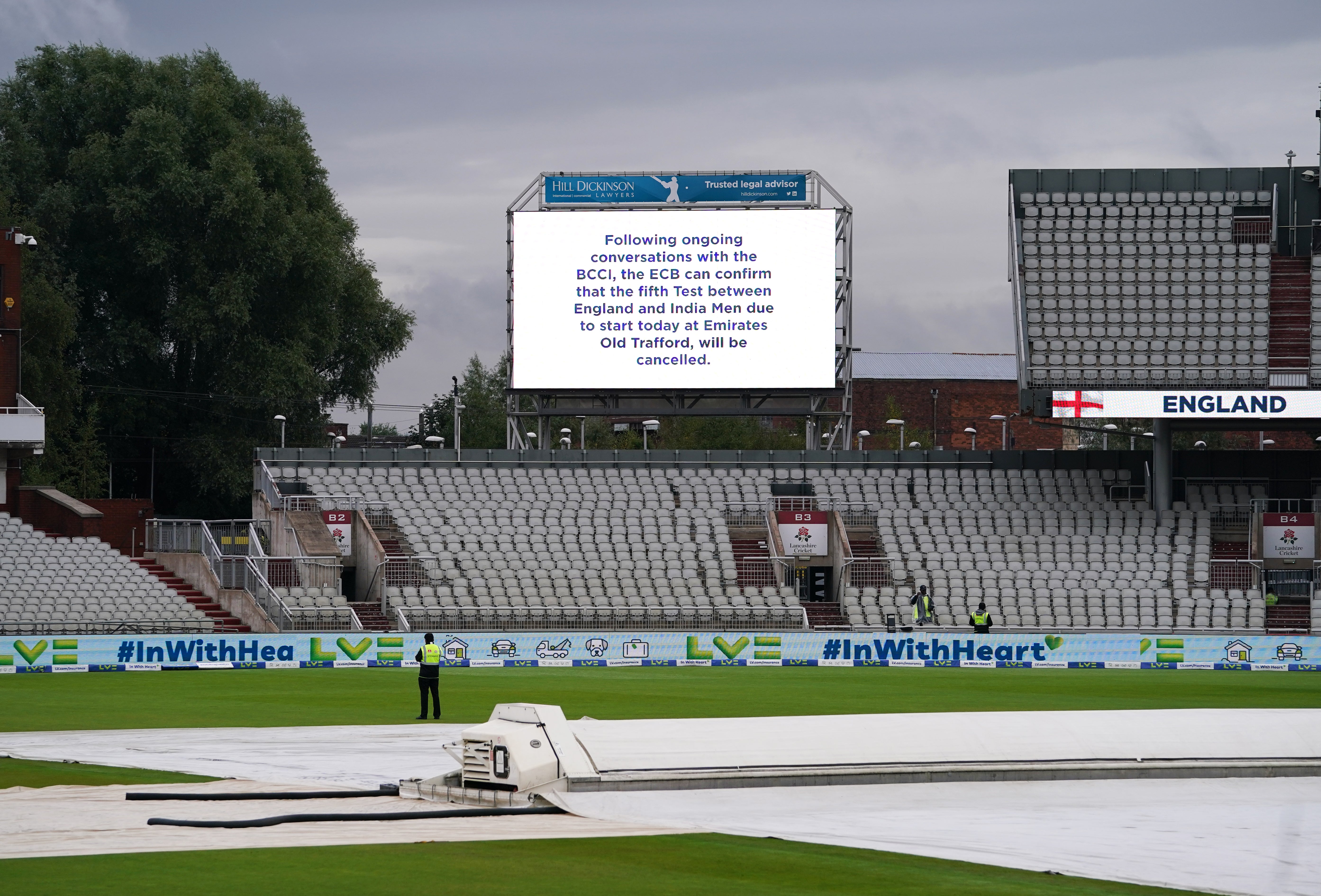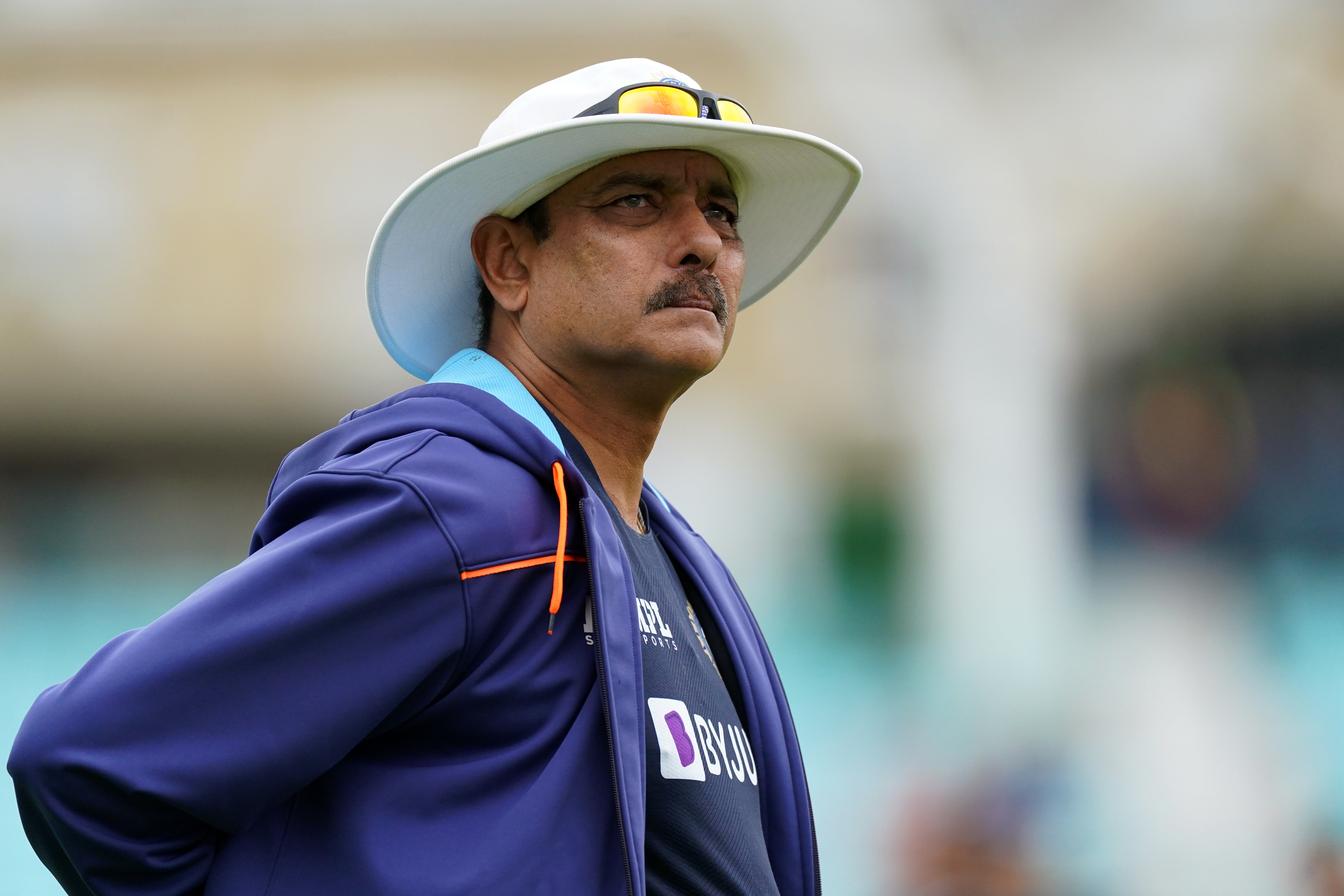ECB, India and Old Trafford in damage limitation mode after cancelled Test
Covid-19 concerns among the India backroom staff left the tourists unwilling to take to the field for the series decider.

Your support helps us to tell the story
From reproductive rights to climate change to Big Tech, The Independent is on the ground when the story is developing. Whether it's investigating the financials of Elon Musk's pro-Trump PAC or producing our latest documentary, 'The A Word', which shines a light on the American women fighting for reproductive rights, we know how important it is to parse out the facts from the messaging.
At such a critical moment in US history, we need reporters on the ground. Your donation allows us to keep sending journalists to speak to both sides of the story.
The Independent is trusted by Americans across the entire political spectrum. And unlike many other quality news outlets, we choose not to lock Americans out of our reporting and analysis with paywalls. We believe quality journalism should be available to everyone, paid for by those who can afford it.
Your support makes all the difference.Officials from England and India were locked in damage limitation mode on Friday after the dramatic last-minute cancellation of the decisive fifth Test at Emirates Old Trafford.
Emergency talks had been raging through the night but it was not until shortly before 9am, little more than two hours before the scheduled start and only a few minutes before the gates were due to open to a sell-out crowd of 22,000 fans, that game was called off due to Covid-19 concerns in the Indian camp.
Their entire playing squad returned a round of negative PCR tests on Thursday but by then a positive test among the backroom staff – their fourth such case in the last week – had already spooked the squad, leaving India unable to field a team.
The England and Wales Cricket Board initially said India had forfeited the match, an explosive conclusion which would have seen them surrender their 2-1 series lead, but that wording disappeared quickly from a revised statement as negotiations escalated behind the scenes. The tourists later issued their own assessment suggesting they were willing to reschedule the match due to their “strong relationship” with the ECB
That will not happen quickly, with the Indian Premier League starting back up on September 19 in the United Arab Emirates, and players from both squads jetting off to take part on Wednesday. Instead, adding a Test match into next summer’s calendar, when India are already due to visit these shores for six white-ball matches, is viewed as a potential solution.
That would be welcome news for Lancashire, who estimate a “multi-million pound loss” as a result of the cancellation and are already looking to the ECB to help them avert financial disaster. Remarkably the final result of the LV= Insurance Series remained up in the air and it appears the International Cricket Council may be called upon to decide on the outcome.
ECB chief executive Tom Harrison who spent a sleepless night leading the crisis talks with counterparts at the Board of Control for Cricket in India and is likely to have several more to come as he navigates a way through the episode, bemoaned “a sad day for Test cricket internationally”.
He also made it clear he did not buy into any suggestions that the IPL had been prioritised over a prestigious Test match, rejecting the idea that the fear of missing out on the lucrative T20 tournament had caused the disquiet among India’s squad.
“Let me be super clear, I don’t think the IPL has anything to do with this,” he said.
“This is not a situation which has been created by the rescheduled IPL, I fundamentally do not believe that for a second. This Indian cricket team are as passionate about Test cricket as fans in our country are.”
Concerns over the fate of the fixture first arose on Thursday, when India scrapped their pre-match training session and press conference amid reports they had been confined to their rooms pending their latest batch of results.
With head coach Ravi Shastri having tested positive during the fourth Test at the Kia Oval, alongside bowling coach Bharat Arun and fielding coach Ramakrishnan Sridhar, unrest in the camp was escalating and it soon became clear India could not field 11 willing players.
“The BCCI and ECB held several rounds of discussion to find a way to play the Test match, however, the outbreak of Covid-19 in the Indian team contingent forced the decision,” the Indian board said in a statement.
“In lieu of the strong relationship between BCCI and ECB, the BCCI has offered to ECB a rescheduling of the cancelled Test match. Both the boards will work towards finding a window to reschedule this Test match. The BCCI has always maintained that the safety and well-being of the players is of paramount importance and there will be no compromise on that aspect.”

Harrison would welcome a replacement Test next summer, but admitted he had no idea how or if that would feed into the existing series, which forms part of the World Test Championship.
“I think we have to just take a breath and do some work with the ICC, to formally ask them to adjudicate on the result of this,” he said.
“At this point we are looking forward to making sure we can reschedule this match at some point in the near future. Whether that is part of this series, a fresh one-match series or the first match of another series, I don’t know yet.
“We will separately have ICC adjudicate over whether this series is completed now, whether that fifth match is null and void or whether it’s actually regarded as a forfeiture or something else.”
The issue of insurance underpins much of what happens next. An India forfeit would allow England to pursue a claim on around £10million of lost revenue attached to the match, including the ticket and corporate refunds they have already committed to. A Covid cancellation, meanwhile, would be viewed differently and may not be covered.
“Yes, there is a tangible difference between those things. This is not a Covid cancellation,” Harrison asserted.
“This is a match cancelled because of serious concerns over the mental health and well-being of one of the teams. There is a difference. It doesn’t make a difference in respect of a ticket buyers, they will be paid back in full, it makes a difference in terms of the ECB balance sheet.”
Each Test match in England is believed to be worth around £20m as part of the broadcast agreements, another reason why rearranging for 2022 would appear to be the path of least resistance.
In the short term, Lancashire chief executive Daniel Gidney made it clear the club was in no position to withstand the initial financial blowback without help from the governing body.

The pandemic has had a profound effect on cash reserves at county level and there is precious little wriggle room in the accounts.
“It’s over seven figures, multi-million pounds,” he said of the estimated losses.
“That’s something we have to manage, deal with and work through with the authorities. These are pretty unprecedented circumstances.
“It’s very difficult to quantify in terms of a five-day Test but we are in mitigation mode at this point. We will need to work with the ECB and others to support us through this.”